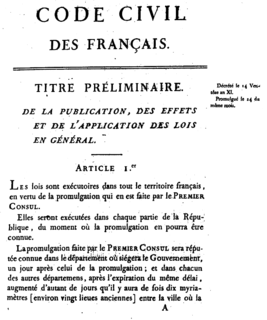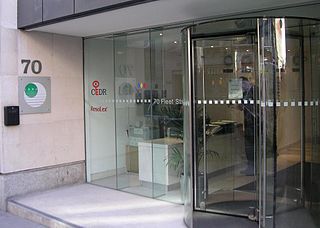Double jeopardy is a procedural defence that prevents an accused person from being tried again on the same charges and on the same facts, following a valid acquittal or conviction. As described by the U.S. Supreme Court in its unanimous decision concerning Ball v. United States 163 U.S. 662 (1896), one of its earliest cases dealing with double jeopardy, "the prohibition is not against being twice punished, but against being twice put in jeopardy; and the accused, whether convicted or acquitted, is equally put in jeopardy at the first trial."

A jury trial, or trial by jury, is a lawful proceeding in which a jury makes a decision or findings of fact. It is distinguished from a bench trial in which a judge or panel of judges makes all decisions.
The plea bargain is any agreement in a criminal case between the prosecutor and defendant whereby the defendant agrees to plead guilty or nolo contendere to a particular charge in return for some concession from the prosecutor. This may mean that the defendant will plead guilty to a less serious charge, or to one of the several charges, in return for the dismissal of other charges; or it may mean that the defendant will plead guilty to the original criminal charge in return for a more lenient sentence.
In law as practiced in countries that follow the English models, a pleading is a formal written statement of a party's claims or defenses to another party's claims in a civil action. The parties' pleadings in a case define the issues to be adjudicated in the action.
Criminal procedure is the adjudication process of the criminal law. While criminal procedure differs dramatically by jurisdiction, the process generally begins with a formal criminal charge with the person on trial either being free on bail or incarcerated, and results in the conviction or acquittal of the defendant. Criminal procedure can be either in form of inquisitorial or adversarial criminal procedure.

The Napoleonic Code (French: Code Napoléon; officially Code civil des Français, referred to as Code civil) is the French civil code established under Napoleon I in 1804.

The General Court (EGC) is a constituent court of the Court of Justice of the European Union. It hears actions taken against the institutions of the European Union by individuals and member states, although certain matters are reserved for the European Court of Justice. Decisions of the General Court can be appealed to the Court of Justice, but only on a point of law. Prior to the coming into force of the Lisbon Treaty on 1 December 2009, it was known as the Court of First Instance.
In law, a judgment is a decision of a court regarding the rights and liabilities of parties in a legal action or proceeding. Judgments also generally provide the court's explanation of why it has chosen to make a particular court order.
The Civil Procedure Rules (CPR) are the rules of civil procedure used by the Court of Appeal, High Court of Justice, and County Courts in civil cases in England and Wales. They apply to all cases commenced after 26 April 1999, and largely replace the Rules of the Supreme Court and the County Court Rules.

The Group of States against Corruption, the Council of Europe’s anti-corruption monitoring body with its Headquarters in Strasbourg (France), was established, in 1999, as an enlarged Partial Agreement by 17 Council of Europe member States.

In the European Union (EU), enhanced cooperation is a procedure where a minimum of nine EU member states are allowed to establish advanced integration or cooperation in an area within EU structures but without the other members being involved. As of October 2017 this procedure is being used in the fields of divorce law, patents, property regimes of international couples, and European Public Prosecutor and is approved for the field of a financial transaction tax.

The Code of Criminal Procedure is the main legislation on procedure for administration of substantive criminal law in India. It was enacted in 1973 and came into force on 1 April 1974. It provides the machinery for the investigation of crime, apprehension of suspected criminals, collection of evidence, determination of guilt or innocence of the accused person and the determination of punishment of the guilty. Additionally, it also deals with public nuisance, prevention of offences and maintenance of wife, child and parents.
The Mechanism for Cooperation and Verification (CVM) is a safeguard measure invoked by the European Commission when a new member or acceding state of the European Union has failed to implement commitments undertaken in the context of the accession negotiations in the fields of the Area of freedom, security and justice or internal market policy.

The Constitutional Reform and Governance Act 2010 is an Act of the Parliament of the United Kingdom on UK constitutional law which affected the civil service and the ratification of treaties, and made other significant changes. It extends to all parts of the United Kingdom.
The Penal Code of Romania is a document providing the legal basis regarding criminal law in Romania. The Code contains 446 articles. The articles mention aspects such as the national boundaries of law and the crimes that fall under the incidence of penal law. Judicial discretion is granted by the Code through the use of minimum and maximum sentences. The most recent version of the Romanian Penal Code has come into effect on 1 February 2014.

Corruption in Romania can be found in the politics, military, health care and private businesses and poses concerns for foreign investors. Although there have been improvements since the fall of the communist regime in 1989, corruption remains a problem in Romania as it is especially found on all levels of public office, in the police force as well as in the judiciary system. According to Transparency International's annual Corruption Perceptions Index, as of 2018, Romania is the 61st least corrupt country, at par with Cuba and Malaysia, and the fourth most corrupt in the European Union after Hungary, Greece and Bulgaria. Generally, despite efforts using laws and regulations to prevent corruption, enforcement has been weak. Since 2014 however, the investigation and prosecution of medium- and high-level political, judicial and administrative officials by the National Anticorruption Directorate has increased The National Anticorruption Directorate was established in 2002 by the Romanian government to investigate and prosecute corruption related offenses causing damage to the Romanian state.

The Code of Civil Procedure, 1908 is a procedural law related to the administration of civil proceedings in India.

The judiciary of British Virgin Islands is based on the judiciary of the United Kingdom. The British Virgin Islands is a member state of the Eastern Caribbean Supreme Court. The courts are organised at four levels, including the provision for final appeal to the Judicial Committee of the Privy Council in London.

The Treaties of the European Union are a set of international treaties between the European Union (EU) member states which sets out the EU's constitutional basis. They establish the various EU institutions together with their remit, procedures and objectives. The EU can only act within the competences granted to it through these treaties and amendment to the treaties requires the agreement and ratification of every single signatory.
The Civil Code of Romania is the basic source of civil law in Romania. It was adopted by Parliament on 17 July 2009 and came into force on 1 October 2011. It replaced the Civil Code of 1865 as well as the Commercial Code of 1887 and the Family Code of 1954.












